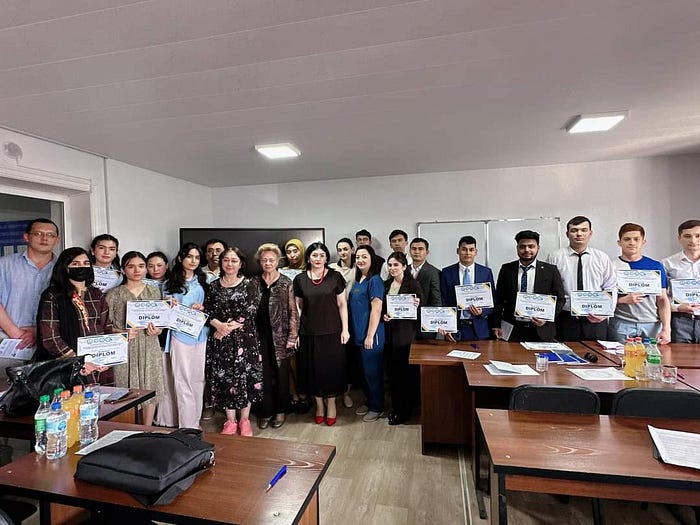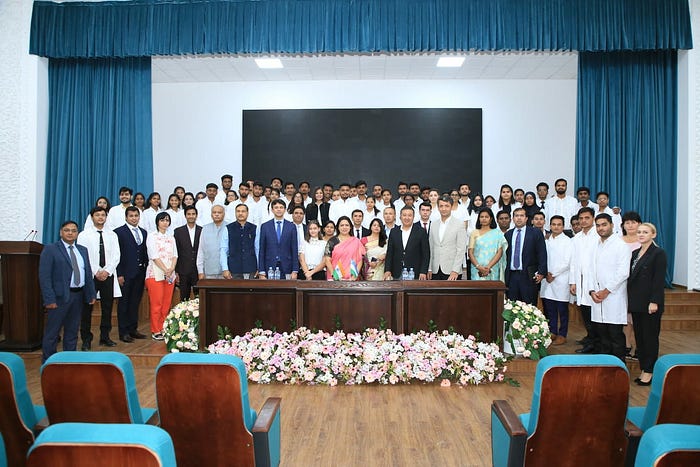
Embarking on a journey to pursue a medical degree is a profound decision that sets the stage for a fulfilling career in healthcare. For many aspiring doctors, studying MBBS (Bachelor of Medicine, Bachelor of Surgery) abroad presents a compelling opportunity to not only gain world-class education but also to broaden cultural horizons and access diverse medical experiences. Among the plethora of options available, Axis Institutes stand out as beacons of excellence, offering comprehensive programs tailored to nurture the next generation of medical professionals. In this blog post, we delve into the benefits of studying MBBS abroad and explore why Axis Institutes are an ideal choice for aspiring doctors.
Why Study MBBS Abroad?
Study MBBS abroad has become increasingly popular among students worldwide, and for valid reasons:

1. Global Recognition: Medical degrees earned from reputable institutions abroad hold significant global recognition, enhancing career prospects not only in the country of study but also internationally.
2. State-of-the-Art Infrastructure: Many overseas medical universities boast state-of-the-art infrastructure, equipped with modern facilities, cutting-edge laboratories, and advanced medical technology, providing students with hands-on learning experiences.
3. Diverse Clinical Exposure: Exposure to diverse clinical settings and patient demographics enriches the learning experience, allowing students to develop a comprehensive understanding of healthcare practices worldwide.
4. Cultural Enrichment: Immersing oneself in a different culture fosters personal growth, cultural competence, and adaptability — essential attributes for healthcare professionals working in multicultural environments.
5. Affordable Education: In several countries, the cost of medical education is comparatively lower than in one’s home country, making studying MBBS abroad a cost-effective option for many students.
Axis Institutes: Your Gateway to Global Medical Education
Among the myriad of options available for studying MBBS abroad, Axis Institutes emerge as leaders in medical education, offering unparalleled opportunities for aspiring doctors. Here’s why:

1. Academic Excellence: Axis Institutes pride themselves on academic excellence, delivering comprehensive medical curricula designed to meet global standards and equip students with the knowledge and skills necessary to excel in their careers. Renowned faculty members, comprising experienced medical professionals and educators, ensure high-quality education delivery.
2. World-Class Infrastructure: Axis Institutes boast world-class infrastructure, including state-of-the-art laboratories, simulation centers, and teaching hospitals equipped with the latest medical technology. Students benefit from hands-on learning experiences in a conducive environment conducive to academic and professional growth.
3. International Accreditation: Accredited by prestigious international bodies, Axis Institutes maintain the highest academic standards, ensuring that students receive a recognized medical education that meets global benchmarks. Graduates are eligible to pursue licensure and practice medicine in various countries worldwide.
4. Clinical Rotations: Axis Institutes facilitate extensive clinical rotations in leading hospitals and healthcare facilities, providing students with exposure to diverse medical specialties, patient populations, and healthcare practices. These rotations complement classroom learning, allowing students to apply theoretical knowledge in real-world healthcare settings.
5. Cultural Immersion: Studying at Axis Institutes offers students a unique opportunity for cultural immersion, fostering cross-cultural understanding and enriching their personal and professional lives. Interacting with peers from diverse backgrounds broadens perspectives and nurtures global citizenship.
6. Scholarship Opportunities: Recognizing the financial challenges faced by many students, Axis Institutes offer various scholarship programs to deserving candidates based on academic merit, financial need, and other criteria. These scholarships help alleviate the financial burden associated with pursuing medical education abroad, making it more accessible to talented individuals.

Conclusion:
Studying MBBS abroad at Axis Institutes opens doors to a world of opportunities, combining academic excellence, cultural enrichment, and professional growth. With a commitment to nurturing the next generation of medical professionals, Axis Institutes provide students with the knowledge, skills, and experiences necessary to thrive in the dynamic field of healthcare. Whether aspiring to become clinicians, researchers, or public health advocates, students can embark on their medical careers with confidence, knowing they’ve received a world-class education from a reputable institution. So, take the first step towards realizing your dreams of becoming a doctor — choose Axis Institutes for your MBBS journey abroad.
1. Q: What are the eligibility criteria for studying MBBS abroad at Axis Institutes?
A: Eligibility criteria vary depending on the country and institution. Generally, students must have completed high school education with a strong background in science subjects such as biology, chemistry, and physics.
2. Q: Is the MBBS degree obtained from Axis Institutes recognized internationally?
A: Yes, Axis Institutes hold international accreditation, ensuring that the MBBS degree obtained is recognized worldwide, allowing graduates to pursue licensure and practice medicine in various countries.
3. Q: What is the duration of the MBBS program at Axis Institutes?
A: The duration of the MBBS program typically ranges from 5 to 6 years, including both academic study and clinical rotations.
4. Q: Are there any scholarship opportunities available for students at Axis Institutes?
A: Yes, Axis Institutes offer various scholarship programs to deserving candidates based on academic merit, financial need, and other criteria.
5. Q: What is the medium of instruction at Axis Institutes?
A: The medium of instruction is primarily English, although some institutions may offer additional language support for non-native English speakers.
6. Q: How are clinical rotations arranged for students?
A: Axis Institutes facilitate clinical rotations in leading hospitals and healthcare facilities, providing students with exposure to diverse medical specialties and patient populations.
7. Q: Can students pursue postgraduate studies after completing MBBS at Axis Institutes?
A: Yes, graduates of Axis Institutes are eligible to pursue postgraduate studies and specialize in various medical fields.
8. Q: What are the accommodation options available for international students?
A: Axis Institutes typically offer on-campus or off-campus accommodation options for international students, including dormitories, apartments, and host families.
9. Q: Are there any language proficiency requirements for international students?
A: While the primary medium of instruction is English, some countries may require international students to demonstrate proficiency in the local language.
10. Q: What is the process for obtaining a student visa to study at Axis Institutes?
A: The process for obtaining a student visa varies depending on the country of study. Generally, students need to provide proof of acceptance from the institution, financial support, and meet health and character requirements.
11. Q: Are there opportunities for research and academic exchange programs at Axis Institutes?
A: Yes, Axis Institutes often collaborate with other institutions worldwide, offering opportunities for research collaborations, academic exchange programs, and international conferences.
12. Q: How does Axis Institutes support students’ career development and job placement?
A: Axis Institutes provide career counseling, job placement assistance, and networking opportunities to help students transition smoothly into their medical careers.
13. Q: Are there opportunities for clinical electives or internships during the MBBS program?
A: Yes, many Axis Institutes offer opportunities for clinical electives and internships, allowing students to gain practical experience in their areas of interest.
14. Q: Can international students work part-time while studying at Axis Institutes?
A: Regulations regarding part-time work for international students vary depending on the country of study. Students should check with the relevant authorities for eligibility and restrictions.
15. Q: What support services are available for international students at Axis Institutes?
A: Axis Institutes offer a range of support services for international students, including orientation programs, academic advising, counseling services, and student clubs and organizations.
16. Q: How are tuition fees and other expenses structured at Axis Institutes?
A: Tuition fees and other expenses vary depending on the institution and country of study. Students should refer to the specific institution’s website or contact admissions offices for detailed information.
17. Q: Are there opportunities for international exchange programs during the MBBS program?
A: Yes, many Axis Institutes offer international exchange programs, allowing students to study abroad for a semester or participate in short-term medical missions.
18. Q: How does Axis Institutes ensure the safety and well-being of international students?
A: Axis Institutes prioritize the safety and well-being of international students, providing support services, emergency assistance, and campus security measures.
19. Q: Can students transfer credits earned at Axis Institutes to other institutions?
A: Transfer credit policies vary among institutions. Students interested in transferring credits should consult with academic advisors and admissions offices for specific guidelines.
20. Q: How can prospective students apply to study MBBS abroad at Axis Institutes?
A: Prospective students can typically apply online through the institution’s website or through authorized agents. The application process usually involves submitting academic transcripts, standardized test scores, letters of recommendation, and a personal statement.





















